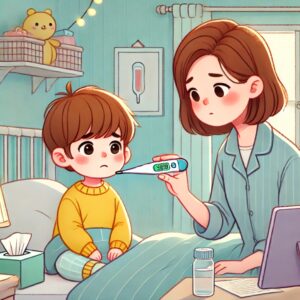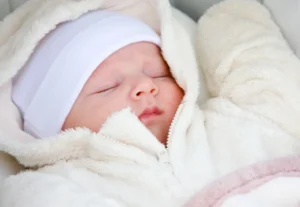When your child catches a cold, you might focus on monitoring their temperature and cough. However, if your child seems to recover from the cold but continues to feel lethargic and exhausted, it might indicate other health issues, particularly related to the heart. In this article, we’ll discuss the common causes of fatigue in children after a cold and how parents can identify and respond to these symptoms.
Common Causes of Fatigue After a Cold
1. Excessive Physical Energy Consumption
During a cold, children often experience fever and coughing, which require significant energy from the body to fight off the infection. In addition, the immune system works overtime to combat the virus or bacteria, consuming a lot of energy. Even if the cold symptoms improve, the child may still feel fatigued as their body is still recovering.
What Should Parents Do?
In this case, parents should encourage their child to rest and avoid strenuous activities. Fatigue usually improves with adequate rest.
2. Inadequate Nutritional Intake
A cold can often lead to a decrease in appetite, which in turn affects the child's ability to eat properly. As the child’s appetite decreases, they may not consume enough nutrients, leading to insufficient energy intake. Malnutrition can worsen fatigue, making recovery even slower.
What Should Parents Do?
Parents can offer easy-to-digest, nutritious foods like chicken soup, stewed fish, and other easily digestible meals to help replenish the child's energy and support their recovery. Ensuring sufficient fluid intake is also crucial, including water, broth, or electrolyte drinks to prevent dehydration.
3. Myocarditis: A Potential Complication After a Cold
If your child continues to feel extremely fatigued after a cold and exhibits symptoms like rapid heart rate or chest tightness, it may be a sign of myocarditis. Myocarditis is an inflammation of the heart muscle, usually caused by viral infections, and it can occur after a cold, particularly in preschool-aged children.
What Should Parents Do?
Myocarditis symptoms can vary in severity, from mild cold-like symptoms to severe heart failure. Parents should watch for the following signs:
- Pale complexion
- Rapid or irregular heartbeat
- Chest discomfort
- Dizziness or extreme fatigue
If any of these symptoms appear, it’s crucial to seek medical attention immediately for a professional evaluation and treatment.
4. Sleep Deprivation and Immune System Response
During a cold, symptoms like nasal congestion and coughing can significantly impact a child's sleep quality. Insufficient sleep exacerbates fatigue and can make the child feel more lethargic. Moreover, when the immune system is active to fight off pathogens, it consumes a lot of energy, which can also contribute to the child’s tiredness.
What Should Parents Do?
To help the child recover, parents should ensure they get enough rest. Using a humidifier and saline nasal sprays can help relieve congestion and improve sleep. Creating a quiet, dark environment will also encourage better rest.
Frequently Asked Questions (FAQ) About Child Fatigue After a Cold
1. Is it normal for a child to feel tired after a cold?
Yes, fatigue is a common symptom after a cold, especially when the body is recovering. However, if fatigue lasts longer than a few days or is accompanied by other unusual symptoms, it’s important to seek medical advice.
2. How can I tell if my child has myocarditis after a cold?
In addition to persistent fatigue, parents should watch for symptoms like pale skin, rapid or irregular heartbeat, chest tightness, and dizziness. If any of these signs are present, immediate medical attention is necessary.
3. What should I do if my child’s appetite decreases during a cold?
Offer easy-to-digest, nutritious foods like chicken or fish soup to provide energy. Also, ensure the child is drinking enough fluids to stay hydrated.
4. How can I help my child sleep better while they have a cold?
Using a humidifier, saline nasal spray, and ensuring the child is in a quiet, dark room will help improve their sleep quality and relieve congestion.
5. When should I seek medical help for my child’s fatigue after a cold?
If fatigue lasts for more than a week or is accompanied by abnormal heart symptoms (such as an irregular heartbeat or rapid breathing), parents should seek medical help immediately.
Key Takeaways
Understanding the potential causes of fatigue after a cold is crucial for ensuring your child’s health. In most cases, adequate rest, proper nutrition, and sleep will help a child recover. However, parents should be alert to the signs of myocarditis and other potential complications. Early identification and prompt medical care can significantly reduce the risk of serious health issues. With proper care and timely treatment, most children with myocarditis can make a full recovery. Parents should remain vigilant during their child's recovery process to ensure they grow up healthy and strong.
References:
- "Myocarditis in Children: Symptoms, Diagnosis, and Treatment," American Heart Association
- "Understanding Post-Cold Fatigue in Children," Mayo Clinic
- "Pediatric Infections and Complications," American Academy of Pediatrics













